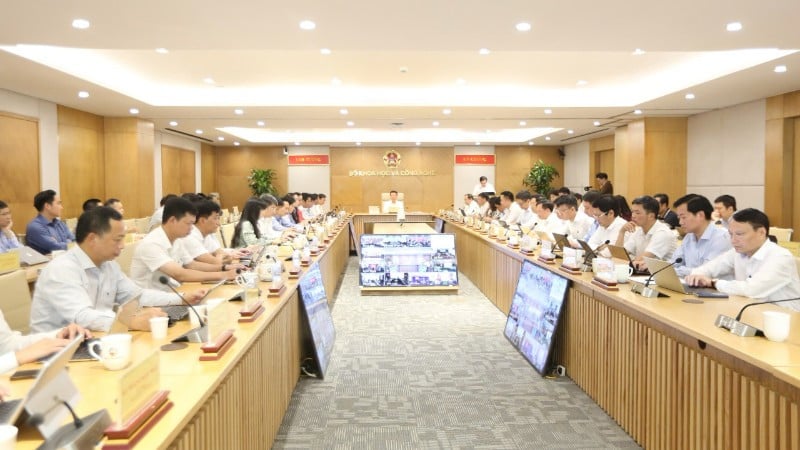
Digital platforms are effective
The above information was presented at the State management conference for the third quarter of 2025 of the Ministry of Science and Technology held on the morning of September 12 in Hanoi. Chief of Office of the Ministry of Science and Technology Ha Minh Hiep said that as of August 2025, the rate of online records in the entire process of the total number of administrative procedures nationwide reached 39.71%, an increase of 3.26% over the same period in 2024. Of which, the central ministries and branches reached 52.45%, while the local sector only reached 15.79%...
According to the leaders of the Ministry of Science and Technology, the national data integration and sharing platform (NDXP) continues to demonstrate its role as the "backbone" of digital transformation. Currently, more than 90 ministries, branches, localities, organizations and enterprises have connected; 30 large databases have been shared. Since its launch, NDXP has processed more than 3.6 billion transactions, of which 222 million transactions in the third quarter alone, an average of about 3.7 million transactions per day. Statistics show that digital data infrastructure is increasingly becoming more substantial, directly serving the management work and needs of people and businesses.
In addition to the achieved results, the direction and management work at the Central level also left its mark with many key activities. The Ministry of Science and Technology has issued a document guiding the implementation of the Intelligent Monitoring and Operation Center (IOC), ensuring interconnection and effective exploitation of information and data to serve the direction, management and socio-economic development of localities (Document No. 3640/BKHCN-CĐSQG dated August 4, 2025).
Next, the List of pilot solutions for comprehensive digital transformation at the provincial level, version 1.0 for the 2025-2026 period, was also approved (Decision 1565/QD-BKHCN dated June 30, 2025). In particular, the Ministry also issued a Training Program on digital transformation in 2025 (Decision 1596/QD-BKHCN dated July 3, 2025), aiming to equip the staff directly involved in local implementation with necessary knowledge and skills... These steps show that digital transformation is not only a strategic orientation, but is gradually entering state management practice, creating an important foundation for the process of building a two-level digital government and a digital economy in Vietnam.
Bright spots in localities
Many localities have made their mark in implementing two-level digital government. Hanoi, Ho Chi Minh City, Hue, Ca Mau, Bac Ninh, Hung Yen, Lao Cai, Lang Son, Phu Tho, Ninh Binh and Son La are among the leading localities in the country when 100% of communes and wards have completed the targets and been "greened" according to the criteria in Plan 02-KH/BCĐTW. Today's conference assessed that this is considered an important step forward, affirming the readiness of central cities as well as many provinces in the digital transformation process.
A notable point in Hanoi is that the city has submitted major plans: Big data development 2025-2030, Regulations on data management and sharing, Smart urban plan 2025, issuance of electronic identification codes and management of digital signatures according to a 2-level model. 100% of departments and branches registered to open data; 14 out of 18 departments, branches and units registered to open data have opened data, reaching a rate of 77.78%; the ratio of open data to total registered data reached 53.76%. At the same time, the city promotes 4G/5G/6G in high-tech parks, industrial parks, and R&D centers, creating a foundation for artificial intelligence (AI) and digital economy.
Ho Chi Minh City implements the Data Management Strategy; continues to integrate and share common data in the state management system, creating a data infrastructure for smart urban services. Notably, Ho Chi Minh City has tested the application of smart robots at the Ward-level Public Administration Service Center. Robots act as receptionists, supporting the reception and guiding people when they come to do procedures, opening up a new direction in applying AI to administrative reform.
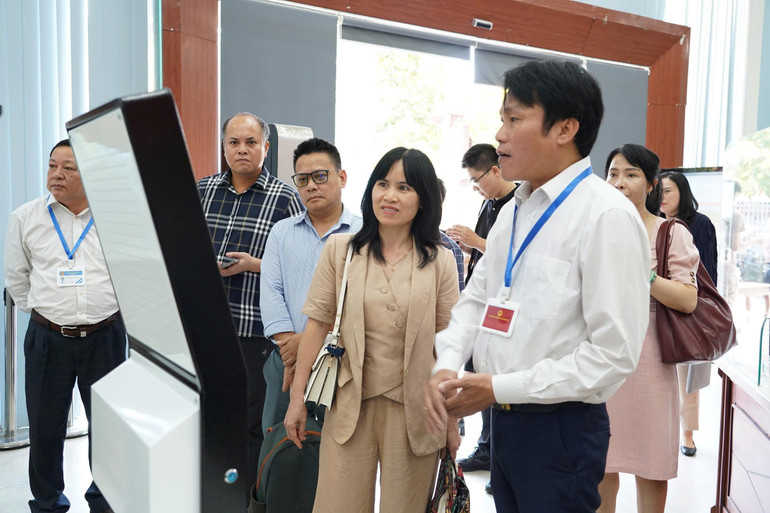
Hue is the leader in digital government, 100% of state agencies from city to commune level provide online public services at full and partial levels and implement one-stop-shop on the network environment; 100% of commune-level People's Committees have information technology infrastructure that meets the modern electronic One-stop-shop model. By July 10, 2025, 40/40 communes and wards have met 16/16 criteria according to Plan 02-KH/BCĐTW, ranking TOP 1 nationwide.
This locality has announced 100% of full-scale online public services that meet city and commune-level requirements; 100% of administrative procedures in the city are implemented regardless of administrative boundaries in July 2025. The rate of online application submission ranks 5th nationwide, reaching 91.79%. At the same time, it has completed the digitalization of 3D underground space (Map4D); and operated IOCv2 to manage urban order.
At the same time, many provinces and cities such as An Giang, Can Tho, Dong Thap, Dak Lak, and Hai Phong have maintained the effective operation of "Rapid Response Support Teams". These teams directly "hold hands and guide", promptly answer questions for officials and people in the process of implementing online public services, contributing to bringing digital transformation into real life.
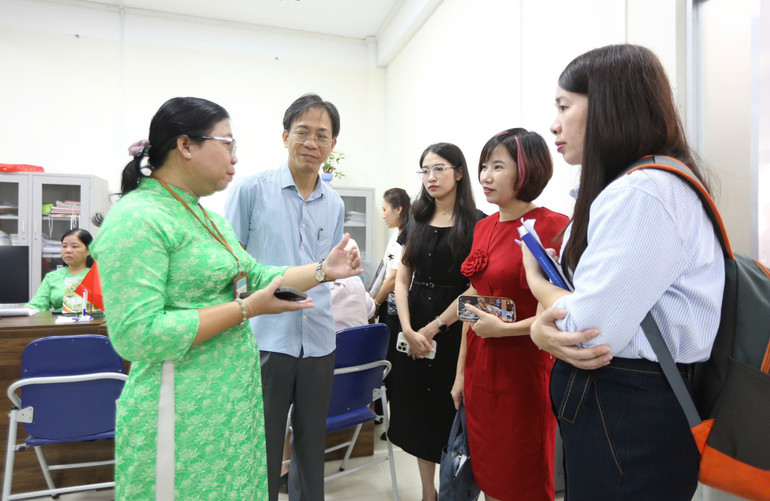
At the conference, the representative of the Department of Science and Technology of Can Tho city said that Can Tho not only launched "Digital Education for the People", signed a cooperation agreement with GENAI FUND on AI application, but also built an AI training plan for civil servants, established a Rapid Response Team and a Community Digital Technology Team. Meanwhile, Ca Mau province launched a "Non-Geographical Administrative Procedure Implementation Point" in Tan Thanh ward, allowing people to submit documents anywhere in the province; promoted cooperation with the University of Queensland - Vingroup Foundation with an estimated value of 10 million USD.
Problems that need to be resolved
In addition to the outstanding results, many localities have reported many difficulties in the implementation process. In Ha Tinh, a major problem arose from the Ministry of Science and Technology issuing Decision 1527/QD-BKHCN (June 29, 2025) on the list and implementation plan of national digital platforms, shared digital platforms for industries, fields and regions.
According to regulations, the competent authorities must develop specific plans, clearly defining the responsibilities of localities as well as coordination mechanisms for implementation. However, by August, many central ministries and branches still did not have detailed plans, causing localities such as Ha Tinh to be confused and not clearly defining the work to be done.
Not only Ha Tinh, Lai Chau and Quang Ninh provinces are also facing difficulties because there is still no circular guiding the determination of job positions in digital transformation. This delay makes it difficult for the provinces to arrange officials and civil servants in the right positions, and at the same time, they cannot make a list of beneficiaries of support policies according to Decree 179/2025/ND-CP.
Many opinions at the conference showed that institutional shortcomings and implementation guidelines are becoming major "bottlenecks". If not promptly resolved, they will directly affect the progress and effectiveness of digital transformation at the grassroots level.
Source: https://nhandan.vn/chuyen-doi-so-but-toc-tao-nen-tang-phat-trien-chinh-quyen-so-hai-cap-post907687.html






![[Photo] Prime Minister Pham Minh Chinh chairs the 14th meeting of the Steering Committee on IUU](https://vphoto.vietnam.vn/thumb/1200x675/vietnam/resource/IMAGE/2025/9/23/a5244e94b6dd49b3b52bbb92201c6986)
![[Photo] Editor-in-Chief of Nhan Dan Newspaper Le Quoc Minh received the working delegation of Pasaxon Newspaper](https://vphoto.vietnam.vn/thumb/1200x675/vietnam/resource/IMAGE/2025/9/23/da79369d8d2849318c3fe8e792f4ce16)






![[INFOGRAPHIC] The moon is drifting further and further away from Earth](https://vphoto.vietnam.vn/thumb/402x226/vietnam/resource/IMAGE/2025/9/24/f6ae93f4f4444689be62035c8bf28ab4)




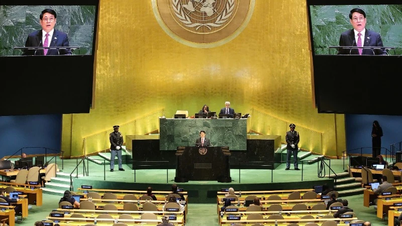

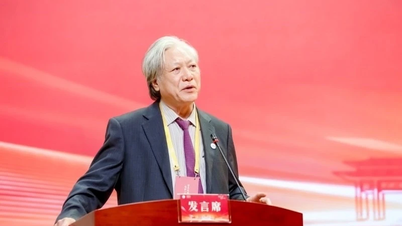
![[Infographic] 11 categories of the Vietnam Tourism Awards 2025](https://vphoto.vietnam.vn/thumb/402x226/vietnam/resource/IMAGE/2025/9/24/f64ecfc21e4f4e00afbec76c7fa02262)






































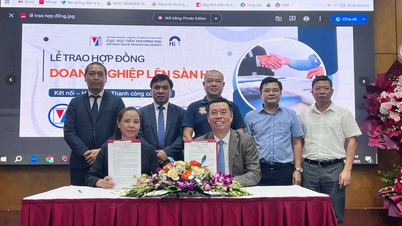


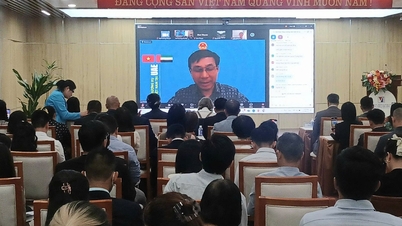





![[Motion Graphics] Ha Tinh continues to restructure the economy, establishing a new growth model](https://vphoto.vietnam.vn/thumb/402x226/vietnam/resource/IMAGE/2025/9/24/5b422027a1374168bcdd5810d37c4c23)




















Comment (0)